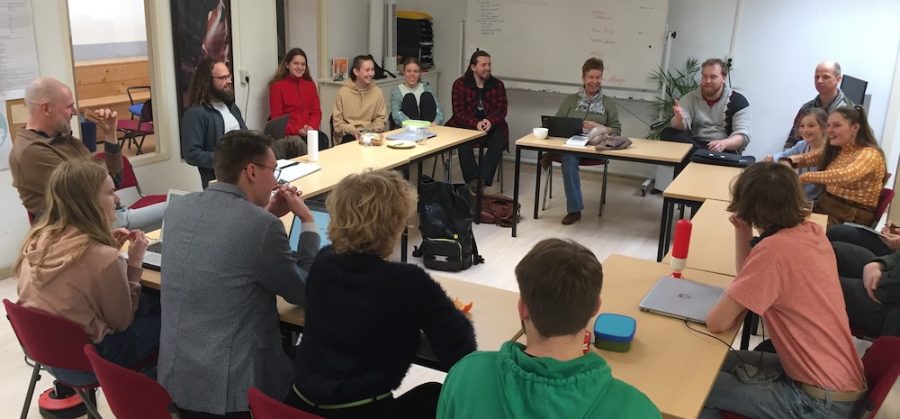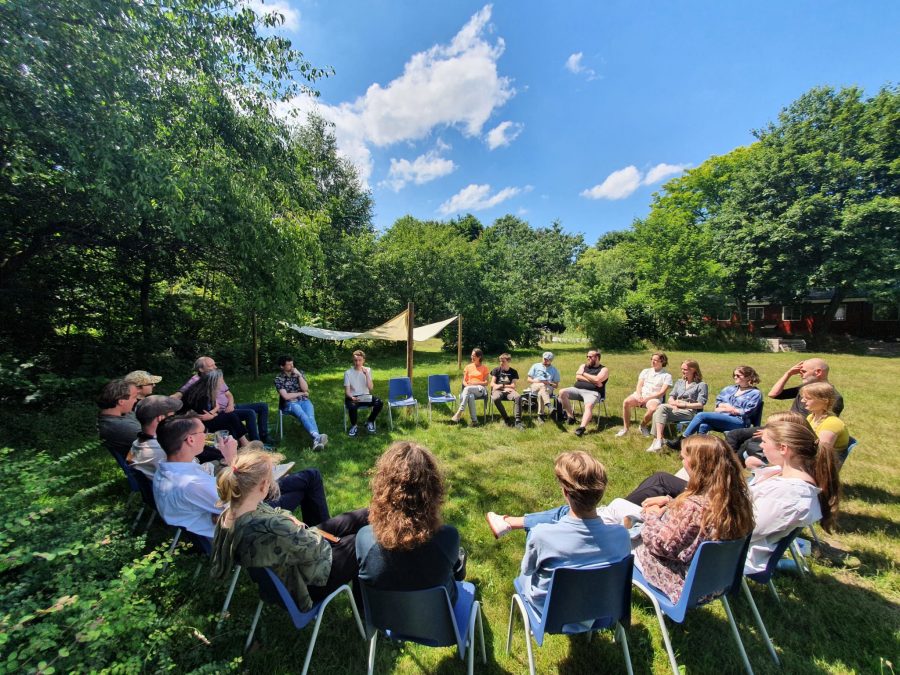Deciding together
The organisation of De Ruimte is based on sociocracy and is a construct of different circles; the School Circle being the organisational and administrative heart of the school. Sociocracy is a way to look at a proposal from different perspectives and to reach a widely supported decision by cooperation.
Beside sociocracy holacracy is being used and we are in the process of creating a hybrid version.
Sociocracy; making decisions within a circle
The beauty of sociocracy is that you are not putting your energy in pros and cons, but use the time to truly listen to everyone’s ideas and suggestions without jumping to reactions. Everyone gets a turn to speak and in several in-depth rounds new insights come up. We call that: ‘building in the centre’. At a certain point enough is said and a proposal surfaces.
The School Circle has a lot of sub-circles, for instance the mediation circle, the ICT circle, the animals circle, the garden circle, the staff cicle, the admissions circle. In many of these circles students take the role of chair or secretary. The circles arise when needed and are nullified when they become superfluous. All circles have their own purpose, mandate, responsibility and budget.

The School Circle (SK)
The accountability of the School Circle is: governing the school in a cooperation of students and staff. Sociocracy warrants the equality of all members. The School Circle meets once a week.
The following agreements apply:
- All enrolled students and all staff members have an equal vote in the School Circle and are therefore called: members of the school circle;
- Decisions made in the school circle meeting apply for the whole school;
- The chairman, secretary, administrator and the treasurer are sociocratically elected for a period of half a school year. It is mostly students fulfilling these roles.
The Mediation Circle (BMK)
It is the accountability of the Mediation Circle to help members of the school circle with:
- solving the tension in situations they are stuck in;
- learning to take responsibility for the rules we have all agreed on;
- recognising one’s role in a conflict;
- finding solutions to prevent similar stressful situations in future;
The Mediation Circle meets every school day at noon. The circle looks into the situations of conflict that are brought to their attention by means of a form. Always present are a student-chairman, a student-secretary, a student-administrator and one staff member. Everyone involved in the situation is summoned to attend. The meeting starts with clearing up the circumstances of the situation. What happened exactly and who was there? People listen to each other’s versions till they all agree on the essence of the situation. Next step is that everybody present in the circle states what he or she thinks would help solve the situation or prevent it in the future, or if they think something else is needed to restore trust. Sometimes the process itself solves the tension, sometimes an action is needed, connected to a date of completion.
I really like the mediation circle. As a chairman, what you mainly try to do is structure the conversation, find out exactly what happened and ensure that all sides of the story are heard. When that happens, it almost resolves itself because they can understand each other and see what was going on. You try to create a safe and open atmosphere in which everyone can express themselves. Usually I approach everyone in a really friendly way: “Hey, something’s going on, let’s see what it is and what we can do to make sure it doesn’t happen again.”
Sophia Dijkstra, 17 jaar

Holacracy
Beside sociocracy holacracy is used to better govern the school. In tactical meetings tensions are addressed using the steps described in holacracy. Tensions are regarded as the fuel for further development of the organisation. De Ruimte is in the process of developing a hybrid form of sociocracy and holacracy.
Family Circle
Due to students at De Ruimte having an equal vote in the sociocracy, we regularly see that this decision making method is also adopted within their families. At home, things start to change.
How nice would it be if you can discuss various topics or proposals in your family and learn to listen carefully to each other without interrupting? And finally come up with a joint proposal about, for example, the tasks that have to be done at home, or about the holiday destination? Families that pick up on this let us know that they get to know and appreciate each other more and that conflicts diminish. How great is that?
The training about deschooling is for most parents their first experience with sociocracy. If enough people are interested, De Ruimte can offer a family course using the CONSENT-method®.
I am a runner for the mediation circle at the moment, I also chaired the domain1 circle when I was younger. That was my introduction to the circle system and because of that I started to take it more seriously. Recently I participated in un-schooling courses for new parents. I like that very much, I want to keep doing that. I like to talk about school and the questions that are asked make me think about my school in a different way.
Olivier van Asperen, 17

